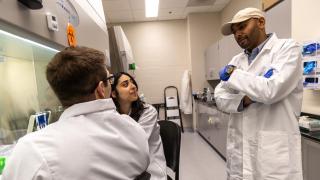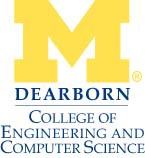

In fall 2011, Chancellor Dan Little, former CECS Dean Subrata Sengupta and several CECS faculty members visited a number of Chinese universities to explore opportunities for additional partnerships. As a result, the college has entered into collaborative education agreements with four more Chinese universities. With the additional agreements in place, more than 130 students from China are expected to enroll at UM-Dearborn in fall 2012.
“Because the initial program with the two universities was so well-received on both sides, we decided to diversify it by creating additional exchange program agreements,” says Yubao Chen, director of China Programs and professor of industrial and manufacturing systems engineering.
The agreements are with some of the best universities across China: Huazhong University of Science and Technology (HUST), Xian Jiaotong University (XJTU), Wuhan University of Technology (WHUT), University of Electronic Science and Technology of China (UESTC), Southeast University (SEU) and Shanghai University of Engineering Science (SUES). The newest agreements are with the latter four universities.
For the undergraduate student exchange program (called “3+2”), CECS will admit qualified seniors from these universities (with three years of study at their home universities) for two more years of study at UM-Dearborn. The students receive bachelor’s degrees from their home universities and master’s degrees from UM-Dearborn. Limited tuition scholarships are also provided.
During the last academic year, 73 students from HUST and XJTU were enrolled at UM-Dearborn.
“The students are among the brightest from their respective universities,” Chen says. “All are doing well in the courses, and some are among the best in their classes. Not only are these students being exposed to a different educational system, they’re also interacting with American students and learning about American culture. The cultural exchange is a big part of the educational experience.”
As part of the collaborative education agreements, UM-Dearborn students are also eligible to study abroad in China at one of the six universities. Chen says opportunities are limited at present due to the small number of courses offered in English. He expects more English-language sections to open in the coming years.
The collaborative education program has received considerable attention from the Chinese government. As mentioned in last month’s Reporter, China’s Scholarship Fund Administration has recognized the agreement with HUST as a “Distinguished Undergraduate Cooperation Program” in the category of “Outstanding Engineers Career Education Plan.” This designation creates additional scholarship opportunities for Chinese students who would not otherwise have the resources to study abroad.
“HUST has recognized only two programs in the world with this prestigious designation,” says Dongming Zhao, professor of electrical and computer engineering (ECE) and coordinator of the 3+2 program. “The other is the University of Technology in Munich, Germany. The designation will help us promote our program to Chinese students who come from underprivileged families. Without financial support, those students would never have had the opportunity to study in America.”
In addition to their coursework, the students become involved with groups like the Intelligent Systems Club, which promotes robotics and the development of technical knowledge. Six students participated this year and enjoyed competing in the ION Autonomous Snowplow Competition, held last January in St. Paul, Minn. The college’s senior design course, a yearlong project that promotes teamwork and cross-disciplinary problem-solving and is required as part of the degree curriculum, also attracts many students from China.
In February, the students held a Spring Festival to celebrate the Chinese New Year. UM-Dearborn also organizes tours to help the students explore cultural attractions across metro Detroit and become more exposed to American culture.
“Studying at UM-Dearborn has allowed me to gain an international view of engineering and a greater understanding of the American way of life,” says Hangxing Sha, a mechanical engineering major from XJTU. “I’ve also been able to improve my English reading and speaking skills. I’ve enjoyed working on team projects with American students and have made many friends through the UM-Dearborn Tennis Club and through the Detroit chapter of Acts of Kindness .
“I want to find a job in the automotive area and will pursue an automotive systems engineering graduate degree at UM-Dearborn.”
Qi Dai, a student from XJTU, completed his undergraduate education at UM-Dearborn and is now pursuing a master’s in electrical and computer engineering. He decided to study abroad while he was a freshman at his home university.
“I knew from my teachers that the United States has the world’s best higher education and academic research system,” Dai says. “ Dearborn is near Detroit, which offers many opportunities for engineering students.”
Dai is employed as a research assistant for Yi Lu Murphey, chair and professor of ECE. Dai also served as a translator for UM-Dearborn’s Office of International Affairs and as a student technician for CASL Technical Services.
“Through my work with Prof. Murphey, I have learned how to do academic research and interact efficiently with the other members of our research team,” Dai says. “While doing the translation work, I came to greatly appreciate the differences and similarities between the Chinese and American cultures.”
Dai plans on applying for internships and seeking a job with an American company like IBM.
“This program boosts UM-Dearborn’s international reputation and further enhances the educational environment for our students here on campus,” Chen says.
Article reprinted from Dearborn Engineer magazine.




